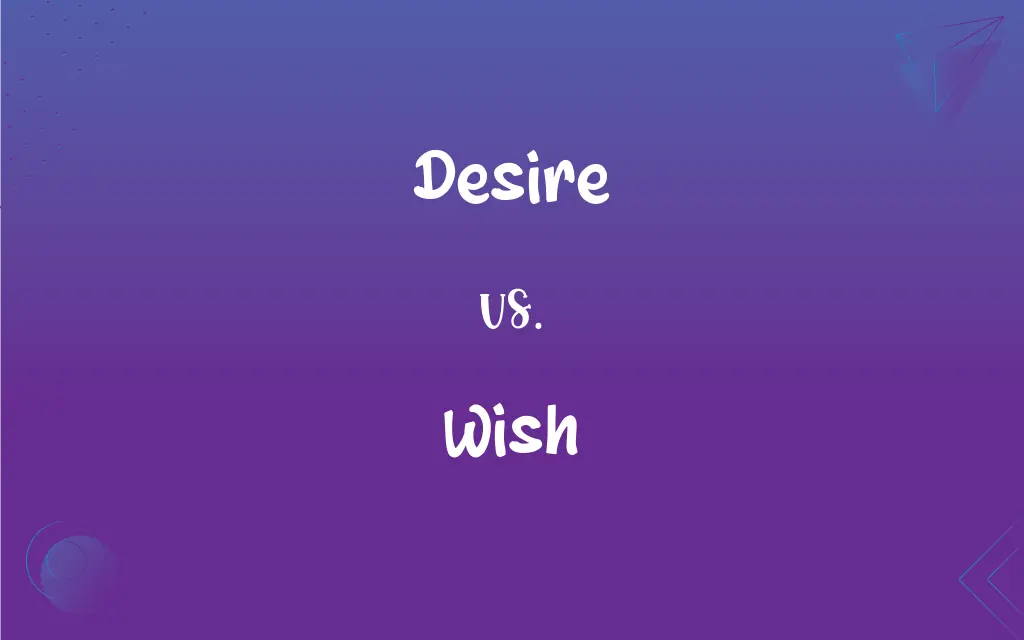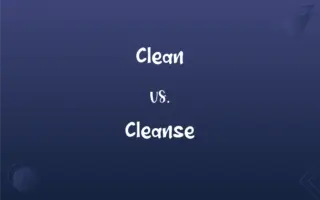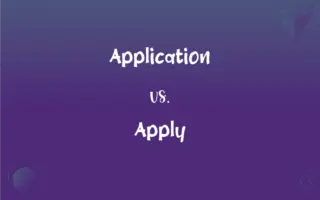Desire vs. Wish: What's the Difference?
Edited by Harlon Moss || By Janet White || Updated on October 3, 2023
Desire is a strong feeling of wanting to have something or wishing for something to happen, while Wish tends to be a request or hope for an outcome or situation, often unreal or unattainable.

Key Differences
Desire is often seen as a robust and continuous feeling which seeks satisfaction through obtaining or achieving something. It might have a stronger and sometimes prolonged emphasis on the physical or psychological need for the object or outcome. For example, one might desire a specific career due to its benefits or alignment with personal skills and passions.
On the other hand, Wish frequently carries a connotation of something that might be more whimsical or unattainable - it is often something that the individual wants but recognizes may not be possible. For instance, one might wish to win the lottery, understanding the odds are very slim.
Desire can also be seen as a more passionate and tangible wanting that might drive actions or plans to make it come to fruition. It is usually more associated with realistic or attainable goals or objects. It’s not rare to hear it in contexts that might involve planning or strategies.
Wish, while still representing a want, might not always instigate action or planning due to its occasional pairing with less realistic or more fantastical wants. People might express a wish on whimsy without an actual plan or expectation of fulfillment.
Both Desire and Wish can be expressed verbally or internally but they showcase different intensities and possible actions towards obtaining what is wanted. While desires might often lead to planning and actions towards obtaining the target, wishes might not always impact behavior or plans to the same extent.
ADVERTISEMENT
Comparison Chart
Intensity
Strong and continuous feeling.
Might be lighter or whimsical.
Attainability
Often realistic and attainable.
Can be unattainable or fantastical.
Drive to Action
Might instigate planning or action.
May not lead to actions or plans.
Usage Example
I desire a piece of chocolate.
I wish I had a million dollars.
Common Contexts
Often used in practical or actionable contexts.
Used in various contexts, real or fantastical.
ADVERTISEMENT
Desire and Wish Definitions
Desire
A strong want for something.
His desire for knowledge is evident in his reading habits.
Wish
A want for a specific outcome.
My only wish is for your happiness.
Desire
A feeling that prompts interest.
The movie ignited a desire to learn about space.
Wish
An expression for unattainable wants.
He expressed a wish to fly like a bird.
Desire
A powerful motivation for a goal.
Her desire to help others inspired her charity work.
Wish
A lighter, possibly whimsical want.
I wish I could eat endless ice cream without consequences.
Desire
A personal inclination towards something.
His desire towards healthy eating motivated his diet.
Wish
A feeling that one would like to have or do something or to see something happen; a desire, longing, or strong inclination for a specific thing.
Desire
To wish or long for; want
A reporter who desires an interview.
A teen who desires to travel.
Wish
An expression of a desire, longing, or strong inclination
Carried out the wishes included in the will.
Desire
To want to have sex with (another person).
Wish
An expression of desire for the happiness or success of another
Sent me his best wishes.
Desire
To express a wish for; request.
Wish
Something desired or longed for
Finally got his wish to see the ocean.
Desire
The feeling of wanting to have something or wishing that something will happen.
Wish
To long for; want.
Desire
An instance of this feeling
She had a lifelong desire to visit China.
Wish
To feel or express a desire for
I wish them good luck. He wished her good night.
Desire
Sexual appetite; passion.
Wish
To order, entreat, or request
I wish you to go. I wish it to be known that I disagree.
Desire
An object of such feeling or passion
A quiet evening with you is my only desire.
Wish
To desire (something bad) to happen to someone
I would not wish such an illness on anyone.
Desire
(Archaic) A request or petition.
Wish
To have or feel a desire
Wish for a successful outcome.
Desire
To want; to wish for earnestly.
I desire to speak with you.
Wish
To express a wish.
Desire
To put a request to (someone); to entreat.
Wish
A desire, hope, or longing for something or for something to happen.
Have a wish
Make someone's wish come true
Desire
To want emotionally or sexually.
She has desired him since they first met.
Wish
An expression of such a desire, often connected with ideas of magic and supernatural power.
Make a wish
Desire
To express a wish for; to entreat; to request.
Wish
The thing desired or longed for.
My dearest wish is to see them happily married.
Desire
To require; to demand; to claim.
Wish
(Sussex) A water meadow.
Desire
To miss; to regret.
Wish
(transitive) To desire; to want.
I'll come tomorrow, if you wish it.
Desire
(countable) Someone or something wished for.
It is my desire to speak with you.
You’re my heart’s desire.
Wish
To hope (+ object clause with may or in present subjunctive).
Desire
(uncountable) Strong attraction, particularly romantic or sexual.
His desire for her kept him awake at night.
Wish
To hope (for a particular outcome), even if that outcome is unlikely to occur or cannot occur.
I wish I could go back in time and teach myself what I know now.
Desire
(uncountable) The feeling of desiring; an eager longing for something.
Too much desire can seriously affect one’s judgment.
Wish
(ditransitive) To bestow (a thought or gesture) towards (someone or something).
We wish you a Merry Christmas.
Desire
(uncountable) Motivation. en
Wish
To request or desire to do an activity.
Desire
To long for; to wish for earnestly; to covet.
Neither shall any man desire thy land.
Ye desire your child to live.
Wish
(transitive) To recommend; to seek confidence or favour on behalf of.
Desire
To express a wish for; to entreat; to request.
Then she said, Did I desire a son of my lord?
Desire him to go in; trouble him no more.
Wish
To have a desire or yearning; to long; to hanker.
They cast four anchors out of the stern, and wished for the day.
This is as good an argument as an antiquary could wish for.
Desire
To require; to demand; to claim.
A doleful case desires a doleful song.
Wish
To desire; to long for; to hanker after; to have a mind or disposition toward.
I would not wishAny companion in the world but you.
I wish above all things that thou mayest prosper.
Desire
To miss; to regret.
She shall be pleasant while she lives, and desired when she dies.
Wish
To frame or express desires concerning; to invoke in favor of, or against, any one; to attribute, or cal down, in desire; to invoke; to imprecate.
I would not wish them to a fairer death.
I wish it may not prove some ominous foretoken of misfortune to have met with such a miser as I am.
Let them be driven backward, and put to shame, that wish me evil.
Desire
The natural longing that is excited by the enjoyment or the thought of any good, and impels to action or effort its continuance or possession; an eager wish to obtain or enjoy.
Unspeakable desire to see and know.
Wish
To recommend; to seek confidence or favor in behalf of.
I would be glad to thrive, sir,And I was wished to your worship by a gentleman.
Desire
An expressed wish; a request; petition.
And slowly was my mother broughtTo yield consent to my desire.
Wish
Desire; eager desire; longing.
Behold, I am according to thy wish in God a stead.
Desire
Anything which is desired; an object of longing.
The Desire of all nations shall come.
Wish
Expression of desire; request; petition; hence, invocation or imprecation.
Blistered be thy tongue for such a wish.
Desire
Excessive or morbid longing; lust; appetite.
Wish
A thing desired; an object of desire.
Will he, wise, let loose at once his ire . . . To give his enemies their wish!
Desire
Grief; regret.
Wish
A specific feeling of desire;
He got his wish
He was above all wishing and desire
Desire
The feeling that accompanies an unsatisfied state
Wish
An expression of some desire or inclination;
I could tell that it was his wish that the guests leave
His crying was an indirect request for attention
Desire
An inclination to want things;
A man of many desires
Wish
(usually plural) a polite expression of desire for someone's welfare;
Give him my kind regards
My best wishes
Desire
Something that is desired
Wish
The particular preference that you have;
It was his last wish
They should respect the wishes of the people
Desire
Feel or have a desire for; want strongly;
I want to go home now
I want my own room
Wish
Hope for; have a wish;
I wish I could go home now
Desire
Expect and wish;
I trust you will behave better from now on
I hope she understands that she cannot expect a raise
Wish
Prefer or wish to do something;
Do you care to try this dish?
Would you like to come along to the movies?
Desire
Express a desire for
Wish
Have in mind;
I will take the exam tomorrow
Desire
A longing for a particular outcome.
She has a strong desire to travel the world.
Wish
Make or express a wish;
I wish that Christmas were over
Wish
Feel or express a desire or hope concerning the future or fortune of
Wish
Order politely; express a wish for
Wish
Invoke upon;
Wish you a nice evening
Bid farewell
Wish
A hope for something to happen.
I wish for sunny weather tomorrow.
Wish
A kind expression for others’ well-being.
My wish for you is health and prosperity.
FAQs
Can “wish” represent something attainable?
Yes, “wish” can refer to both attainable and unattainable or fantastical wants.
Can “desire” refer to sexual attraction?
Yes, “desire” can refer to a strong sexual attraction or appetite.
Is “desire” always linked to tangible wants?
No, “desire” can refer to both tangible items and intangible outcomes or states.
Is “wish” always used for unrealistic wants?
No, “wish” can express both realistic and unrealistic wants, though often without an implication of action.
Is “desire” used in formal contexts?
Yes, “desire” can be used in both formal and informal contexts.
Can “wish” be used as a greeting or farewell?
Yes, “wish” is often used in phrases like “Best wishes” as a positive greeting or farewell.
Can “wish” imply a casual want?
Yes, “wish” can express a casual or non-urgent want, often without an expectation of realization.
Does “desire” imply a level of intensity?
Generally, yes. “Desire” often suggests a strong want or need.
Is “wish” related to fairy tale language?
Often, yes. “Wish” is commonly used in fairy tales and whimsical stories.
Can “desire” indicate a willingness to act?
Yes, “desire” often implies a willingness or intention to pursue or act towards a want.
Can “wish” imply a lack of control over an outcome?
Yes, “wish” often suggests having no power or direct control over realizing the want.
Is “wish” related to traditional expressions?
Yes, “wish” is often used in traditional expressions, like “make a wish” on a birthday.
Can “wish” be used in a negative context?
Yes, “wish” can be used negatively, as in wishing ill upon someone, though it's more commonly positive.
Can “desire” be used as a noun and a verb?
Yes, “desire” can be used both as a noun to denote a strong feeling of wanting and as a verb (desiring).
Can “desire” imply a necessity?
In some contexts, yes. “Desire” can be so strong as to feel necessary to the person wanting.
Can “desire” suggest selfishness?
In some contexts, “desire” might be perceived as self-centered, depending on what is being desired.
Can “desire” be fleeting?
Typically, no. “Desire” usually implies a persistent or ongoing want.
Is “wish” used in everyday speech?
Yes, “wish” is a common term used in everyday language to express wants or hopes.
Is “desire” associated with ambition?
Yes, “desire” can be closely related to ambition when referring to goals or objectives.
Can “wish” be used formally?
While commonly casual, “wish” can be used formally, especially in set phrases like “best wishes”.
About Author
Written by
Janet WhiteJanet White has been an esteemed writer and blogger for Difference Wiki. Holding a Master's degree in Science and Medical Journalism from the prestigious Boston University, she has consistently demonstrated her expertise and passion for her field. When she's not immersed in her work, Janet relishes her time exercising, delving into a good book, and cherishing moments with friends and family.
Edited by
Harlon MossHarlon is a seasoned quality moderator and accomplished content writer for Difference Wiki. An alumnus of the prestigious University of California, he earned his degree in Computer Science. Leveraging his academic background, Harlon brings a meticulous and informed perspective to his work, ensuring content accuracy and excellence.































































